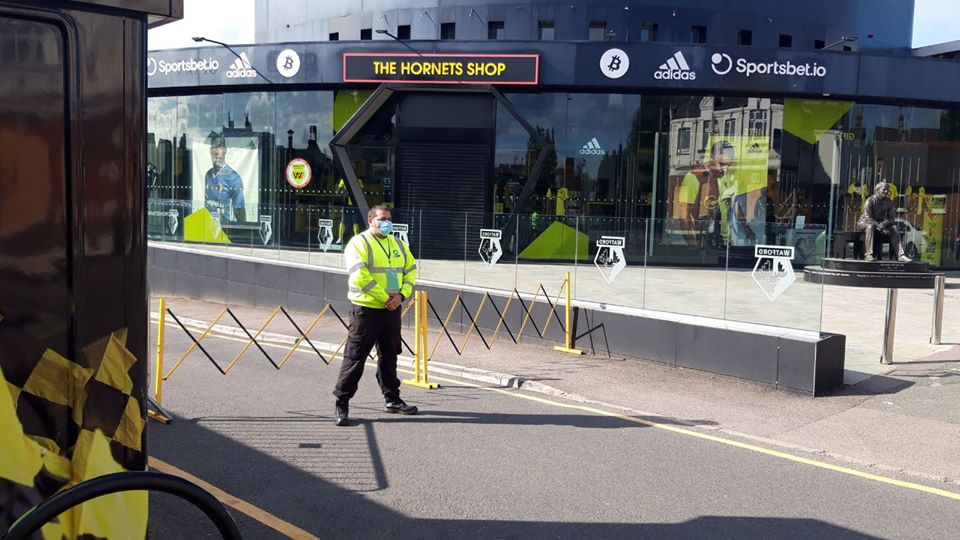CSP shows it's match fit with CSAS as football restarts
A traffic management, stewarding and security company has supplied employees accredited with specialist police powers to its home town football stadium – Watford FC – following the resumption of Premier League football.
Other match grounds where The Combined Services Provider Limited (CSP) has sent staff to assist with match day operations since the restart include Tottenham Hotspur, Arsenal and Crystal Palace.
Matches are being played behind closed doors with clubs and staff adhering to Government COVID-19 safety requirements, such as social distancing, workplace cleaning, the use of personal protective equipment and workforce management.
The Premier League season got back underway on 17 June with two matches at Aston Villa and Manchester City followed by a full round of fixtures the following weekend after being suspended for three months because of the coronavirus pandemic. The matches marked the start of a total of 92 games still to be played this season.
Tony Nikolic, Managing Director, CSP, said that his business supports a number of football and rugby stadia with stewarding, car parking, road closures and traffic management services. Its support includes operatives accredited with police powers at Arsenal, Chelsea, Crystal Palace, Tottenham Hotspur, Reading, Watford and Twickenham as well as the London Stadium – the former Olympic Stadium 2012.
At all events, the numbers of operatives will vary depending on the crowd attendances and road closures required, he explained.
However, since the return of football following the lockdown when matches have played to crowd-free stadiums, the numbers of operatives required have reduced considerably, with some clubs only requiring minimal road or traffic management support or none at all.

Last month (June) PCPI reported that CSP had just one week from initial enquiry to live operations to design and implement detailed plans for the reopening of six waste and recycling centres in North London. Each plan had to be approved by the respective local authorities and the Metropolitan Police, and traffic signage manufactured.
At the same time, CSP was asked by Surrey Police to assist by sending staff with police powers to waste sites at Earlswood, Guildford, Leatherhead and Woking. Today, CSP is supporting three additional Surrey sites with its staff at Caterham, Camberley and Shepperton.
Tony said: “Our services at waste and recycling centres are being extended almost on a weekly basis and our involvement is dependent on visitor numbers and remain ongoing for the time being.”
CSP has provided employees with police powers at the NHS Coronavirus Test Centre in North Greenwich since 12 May. Currently, CSP’s services here are being extended on a fortnightly basis.
CSP’s accredited employees’ responsibilities include managing safe vehicle movements in the queues and at key junctions and roundabouts near the sites whilst minimising impact on local residents and through traffic.
Their staff were accredited with certain police powers under the Community Safety Accreditation Scheme (CSAS), a voluntary scheme, contained in Section 40 of the Police Reform Act 2002.
The role of assessing private sector companies seeking approval to run a CSAS is carried out on behalf of the National Police Chiefs’ Council by Police Crime Prevention Initiatives (PCPI), a police-owned organisation that works on behalf of the Police Service throughout the UK to deliver a wide range of crime prevention initiatives.
PCPI carries out checks to establish whether companies are ‘fit and proper’ to exercise CSAS powers and then makes recommendations to Chief Constables in the area the scheme will operate.
It is Chief Constables in England and Wales who decide whether to accredit employed people already working in roles that contribute to maintaining and improving community safety with limited but targeted powers.
PCPI has assessed more than 120 private sector companies seeking to run a CSAS. The scheme significantly increases the number of businesses able to deliver services that reduce low level crime and disorder whilst assisting police by easing demands on their time and resources.